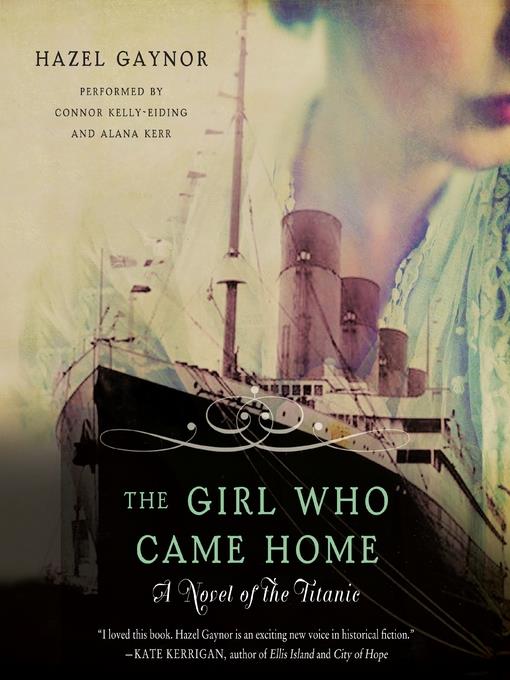
The Girl Who Came Home
A Novel of the Titanic
کتاب های مرتبط
- اطلاعات
- نقد و بررسی
- دیدگاه کاربران
نقد و بررسی

Blending fact and fiction, the story of 17-year-old Maggie Murphy, one of the few steerage passengers on the Titanic to survive, is beautifully narrated by Connor Kelly-Eiding and Alana Kerr. Maggie is reluctant to leave her home, but she must travel with her aunt and a group of Irish emigrés going to America for a better life. As Maggie experiences the horror and tragedy of the doomed ship, she swears never to reveal what happened that night. The two gifted narrators take listeners from Maggie's voyage in 1912 to the year 1982, when she finally reveals her "important" story to her great-granddaughter, Grace. Maggie's lovely young-girl's voice, with its soft Irish lilt, is a flawless fit, while Grace's more modern inflections and aggressive American persona are pitch-perfect. S.J.H. © AudioFile 2014, Portland, Maine

March 15, 2014
The fictionalized saga of 14 Irish immigrants from a single parish who sailed on the Titanic. The year is 1982. Maggie, 87, has never discussed the voyage with any of her descendants, including her great-granddaughter Grace, a journalism student at Chicago's Northwestern University. Grace has been offered an internship at the Tribune--if she can pitch an original angle for a feature story. But when her father dies unexpectedly, she drops out of Northwestern to assist her mother, who has multiple sclerosis, also leaving her boyfriend, Jimmy. Two years later, Maggie jolts Grace back on the career path by deciding to finally come clean about her experience as one of the few third-class passengers who survived the Titanic. The historical sections cannot help but pull focus from the heartwarming frame story. A pastiche of journal entries, letters, telegrams and other archival material, some real, some convincingly faux, relates how 14 parishioners from the village of Ballysheen, County Mayo, decide to emigrate. Once aboard the revolutionary new ocean liner, Maggie and her giggly teenage girlfriends charm Harry, a Liverpudlian third-class steward, who devotes himself to making their passage pleasant. He helps Maggie send a "Marconigram" from the ship to Seamus, the love she left behind. Unfortunately, a certain iceberg intervenes. Her transmission is interrupted, altering its meaning. Harry manages to get Maggie on the last lifeboat; 12 of her fellow travelers are not so lucky. Gaynor wisely avoids the usual Titanic tropes (Astors and Strauses are scarcely mentioned), imagining the recollections of ordinary passengers and of the people anxiously awaiting news of them. Once Grace's article goes the 1982 equivalent of viral, the parallel stories wrap up a bit too neatly, especially in the romance department. Still, as the disaster's 102nd anniversary approaches, Gaynor's account surpasses, in subtlety if not in scope, so many flashier treatments.
COPYRIGHT(2014) Kirkus Reviews, ALL RIGHTS RESERVED.

April 15, 2014
Maggie didn't discuss Titanic with anyone. At 17, she was leaving the man she loved as one of a group of Irish immigrants setting out for America. But 70 years later, as her great-granddaughter, Grace, is mourning her father's death, Maggie decides it's finally time to share her story. Inspired by the true tale of an Irish community that suffered the largest proportional loss in the sinking, the novel hits on the standard elements of the Titanic storythe ship's magnificence, the stark differences between first and third classes, the many elements that contributed to its downfall. What makes Gaynor's novel fresh is the way she sets the tragedy in the context of her characters' lives. Gaynor is a gentle storyteller who doesn't challenge the reader, writing prettily but at times predictably. At the same time, even the most avid Titanic buff is sure to find something new in this well-researched, finely detailed story. Just as Maggie's retelling makes the disaster real for her great-granddaughter, Gaynor brings immediacy to the oft-told story by shrinking it to a human scale.(Reprinted with permission of Booklist, copyright 2014, American Library Association.)

























دیدگاه کاربران